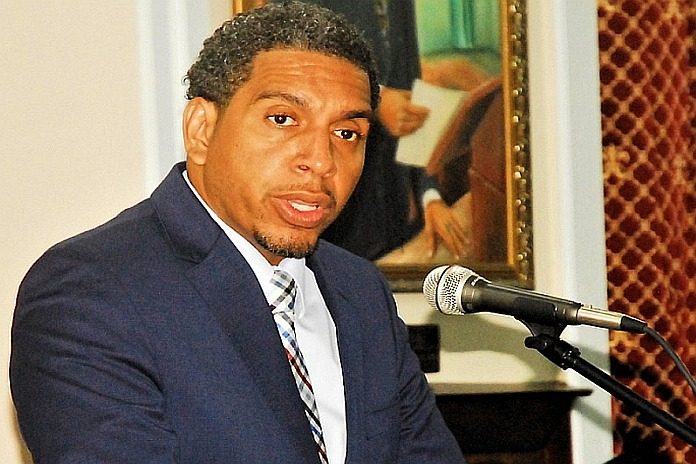By Caribbean News Global contributor
KINGSTOWN, St Vincent — On April 7, 2020, the House of Assembly approved a supplementary budget, finance minister for St Vincent and the Grenadines Camillo Gonsalves recanted, while delivering his ministerial statement, June 22, 2020. He now warns “the world, and Saint Vincent and the Grenadines is looking at a more pronounced, more severe economic fallout than anticipated three months ago.”
Finance minister Gonsalves pointed to the regional socio-economic scenario now faced by other countries in the sub-regional OECS grouping, as COVID-19 continues to affect world economies.
The supplementary budget came two-and-a-half months after the passage of the annual Appropriation Bill in Saint Vincent and the Grenadines “to fund many aspects of the multifaceted Recovery and Stimulus Package that was conceived by the government in response to COVID-19 pandemic,” added, “It was quick and decisive action by the government aiming to achieve three broad policy objectives, namely: to minimising the loss of life and strengthening our public health systems; reduce the economic impact on vulnerable Vincentians, displaced workers and most-affected sectors; and keeping the economy afloat through targeted stimulus spending while maintaining macroeconomic stability and laying the groundwork to resume growth when the pandemic abates.”
Two-and-a-half months ago, projections from the Eastern Caribbean Central Bank (ECCB) predicted a regional contraction of almost seven percent. The estimation was revisited and the central bank now estimates “economic contraction in the Eastern Caribbean Currency Union (ECCU) between 10 and 20 percent in each country.”
The June 2020 edition of the World Bank’s Global Economic Prospects predicts a global contraction of 5.2 percent – the worst such decline in eight decades. Advanced economies are expected to shrink by seven percent, and output of emerging market and developing economies (EMDEs) is expected to contract in 2020 for the first time in at least 60 years.
“Current projections suggest that the COVID-19 recession will involve a 6.2 percent decline in global per capita GDP, making it the deepest global recession since 1945-46, and more than twice as deep as the recession associated with the global financial crisis,” the Global Economic Prospects publication stated.
However, Dr Kenneth Rogoff, professor of economics at Harvard University, goes further, stating that, “the short-term collapse in global output now underway already seems likely to rival or exceed that of any recession in the last 150 years.”
Unlike previous economic crises, where there are winners and losers – or at least a division between “affected and relatively unaffected” countries, the coronavirus pandemic has spurred a truly global collapse. Over 90 percent of countries will experience GDP contractions in 2020-2021, the largest such share of countries since 1870.
Delivering his ministerial statement on June 22, 2020, finance minister Gonsalves said: “Since the passage of our Recovery and Stimulus Package, the global and regional projections for economic decline has become more pessimistic. Here at home, the Vincentian economy, like many others, is experiencing reduced productivity, depressed retail and commercial activity, non-existent tourism and increased unemployment as the immediate result of the COVID pandemic.”
Finance minister Gonsalves disclosed that within the formal private sector, data from the National Insurance Services (NIS) indicate that 395 businesses have partially or completely shut down since March 1, 2020. This represents over 16 percent of the total active employers registered at the National Insurance Service (NIS).
“Over 3,000 claims have been filed with the NIS for employment benefits and displacement supplementary income. This increase in claims suggests that an additional six percent of the labour force is now unemployed. Considering the impact of the pandemic on the informal sector, we can safely assume that the unemployment rate has increased by more than ten percentage points over the last three months,” minister Gonsalves said.
“In Saint Lucia, the corresponding number is 22,000, with 43,000 seeking similar assistance in Barbados. In Antigua and Barbuda, prime minister Gaston Browne has estimated that hotel closures and lockdowns have cost over 20,000 residents their jobs. Saint Vincent and the Grenadines current revenue for May declined by more than 18 percent relative to May 2019,” the finance minister added. “Value Added Tax collections in May, which can sometimes act as a rough proxy for commercial and retail activity, fell by almost 50 percent when compared to the same period last year. Other relatively small, but significant sources of revenue, like alien landholding licences, stamp duties and yacht licences, all suffered the expected collapse as movement, migration and investment became more difficult during the pandemic.”
Three months prior, the government of Saint Vincent and the Grenadines cautioned “that there would be rough waters ahead in our society and economy. Today, we are all experiencing the early swells and choppiness of COVID’s economic fallout.”
While the government of Saint Vincent and the Grenadines revenue decreased by 20 percent in May, the ECCB reported that other OECS countries have experienced a 50 percent decline. Unemployment in Saint Vincent and the Grenadines will likely exceed 30 percent in the short term, the ECCB is predicting 50 percent unemployment rates in some OECS Member States.







